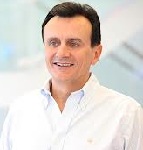 |
| AstraZeneca CEO Pascal Soriot |
AstraZeneca ($AZN) CEO Pascal Soriot is counting on the company's cancer drug pipeline to help it climb out of the revenue hole it has fallen into, and he figures his company needs more manufacturing capacity for the coming launches. Toward that end, the U.K. drugmaker says it will build a $285 million biologics manufacturing facility in Sweden and add up to 250 jobs.
The new filling and packaging facility for protein-based drugs will be at its Södertälje site, home of its largest tablets and capsules manufacturing operation. It expects to be producing product for clinical trials by 2018 for programs for both AstraZeneca and its MedImmune biotech division and be ready for commercial production the next year. When fully operational, it will add 150 to 250 jobs, AstraZeneca said in an announcement today.
"This is a strategically important investment for AstraZeneca to support the accelerating development of biotech medicines, which now make up around half of our pipeline," Soriot said today in a statement. "We expect to bring a significantly increased number of new specialty care medicines to patients in the coming years, driven in large part by biologics. This new plant will give us greater capacity and flexibility to handle clinical trials, and will also play an important role in our future commercial production."
The announcement comes after AstraZeneca laid out plans last fall to spend more than $200 million to expand a biologics facility in Frederick, MD. It said the Sweden project is one piece of a "three-part program to expand AstraZeneca's biologics manufacturing capabilities," details of which will be provided in "coming years."
Like other drugmakers, AstraZeneca is turning more to large-molecule, large-profit specialty drugs to drive its future. Hammered by generic competition for blockbuster acid reflux drug Nexium, AstraZeneca saw revenue fall 6% in the last quarter to $6.06 billion.
One area the drugmaker is looking to is anti-PD-L1 immuno-oncology drugs, a hot new field that is expected to generate lots of money for successful products. But AstraZeneca recently sold off some of the upside potential for its PD-L1 blood cancer candidate with a $450 million deal for Celgene ($CELG) to help develop and market it. On the flip side, it's paying Innate Pharma $250 million to strengthen its immuno-oncology capabilities. AstraZeneca is trailing some other competitors in the field, like Bristol-Myers Squibb ($BMY), whose Opdivo is approved and forging quickly ahead.
- here's the announcement